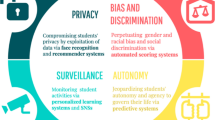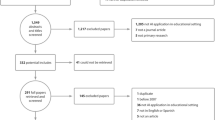Abstract
As the need for teaching Artificial Intelligence (AI) for K-12 is increasing, discussions on what competencies teacher should have for effective teaching of AI is overlooked. In this work, we determine what teacher competencies are necessary for improving the teaching and learning of AI for K-12 with Technological Pedagogical Content Knowledge (TPACK) framework. First, we identify current AI education resources and investigate the core foundations of AI taught to K-12. Based on the findings, we propose teacher competency for K-12 AI education by analyzing AI curricula and resources using the TPACK framework. We conclude that teachers who teach AI to K-12 students require TPACK to construct, prepare an environment, and facilitate project-based classes that solve problems using AI technologies.
Similar content being viewed by others
Change history
04 August 2022
A Correction to this paper has been published: https://doi.org/10.1007/s13218-022-00770-w
References
Touretzky D, Gardner-McCune C, Martin F, Seehorn D (2019) Envisioning ai for k-12: What should every child know about ai? Proceedings of the AAAI Conference on Artificial Intelligence 33:9795–9799
Kim S, Kim S, Lee M, Kim H (2020) Review on artificial intelligence education for k-12 students and teachers. J Korean Assoc Comput Educ 23(4):1–11
Touretzky DS, Gardner-McCune C, Martin F, Seehorn D (2019) K-12 guidelines for artificial intelligence: what students should know. In: Proc. of the ISTE Conference
Touretzky D, Martin F, Seehorn D, Breazeal C, Posner T (2019) Special session: Ai for k-12 guidelines initiative. In: Proceedings of the 50th ACM Technical Symposium on Computer Science Education, pp. 492–493
A new generation of artificial intelligence development plan (f. sapio, w. chen, a. lo, trans.). Retrieved January 15, 2021, from https://flia.org/wp-content/uploads/2017/07/A-New-Generation-of-Artificial-Intelligence-Development-Plan-1.pdf (2017)
Jun Q, Gang L, Ziqiang F (2018) Réngōng zhìnéng shìyán jiàocái(yī niánjí shángcé) [artificial intelligence experimental textbook (first grade volume 1)]. Retrieved January 18, 2021, from https://item.jd.com/12461281.html
Artificial intelligence curriculum for class viii (inspire moduel). Retrieved January 18, 2021, from http://cbseacademic.nic.in/skill-education.html (2017)
Facilitator handbook, artificial intelligence curriculum. Retrieved January 18, 2021, from http://cbseacademic.nic.in/web_material/Curriculum20/AI_Curriculum_Handbook.pdf (2017)
Teaching ai in the classroom, cser digital technologies program. Retrieved January 18, , from https://csermoocs.adelaide.edu.au/available-moocs#teaching-ai-in-the-classroom (2020)
Han A, Kim J, Wohn K (2015) Entry: visual programming to enhance children’s computational thinking. In: Adjunct Proceedings of the 2015 ACM International Joint Conference on Pervasive and Ubiquitous Computing and Proceedings of the 2015 ACM International Symposium on Wearable Computers, pp. 73–76
Jin YH, Kim YS (2011) A meta-analysis on the effects of educational programming language. J Korean Assoc Comput Educ 14(3):25–36
The explanatory research of the learning framework of ai curriculum for k-12. Retrieved January 18, 2021, from https://www.kofac.re.kr/web/contents/resultBoard.do?&schM=view&page=2&viewCount=10&id=17782&schBdcode=&schGroupCode= (2020)
Kim K, Koo D, Kim S et al (2020) Development a standard curriculum model of next-generation software education. J Korean Assoc Inf Educ 24(4):337–367
Ebs sw education platform (esof). Retrieved July 13, 2020, from http://www.ebssw.kr
Csta k-12 computer science standards. Retrieved January 18, 2021, from https://www.csteachers.org/page/standards (2017)
Hong J, Jeon G (2020) Enteuliwa hamkke ingongjineung-ui segyelo [enter the world of artificial intelligence with entry]. Retrieved July 13, 2020, from http://hicomputing.org/108452
Rosenberg JM, Koehler MJ (2015) Context and technological pedagogical content knowledge (tpack): a systematic review. J Res Technol Educ 47(3):186–210
Shulman LS (1986) Those who understand: knowledge growth in teaching. Educ Res 15(2):4–14
Koehler M, Mishra P (2009) What is technological pedagogical content knowledge (tpack)? Contemp Issues Technol Tteacher Educ 9(1):60–70
Vivian R, Falkner K (2019) Identifying teachers’ technological pedagogical content knowledge for computer science in the primary years. In: Proceedings of the 2019 ACM Conference on International Computing Education Research, pp. 147–155
Angeli C, Ioannou I (2015) Developing secondary education computer science teachers’ technological pedagogical content knowledge. Eur J Educ Sci 2(2):9–30
Giannakos MN, Doukakis S, Crompton H, Chrisochoides N, Adamopoulos N, Giannopoulou P (2014) Examining and mapping cs teachers’ technological, pedagogical and content knowledge (tpack) in k-12 schools. In: 2014 IEEE Frontiers in Education Conference (FIE) Proceedings, pp. 1–7. IEEE
Author information
Authors and Affiliations
Corresponding authors
Rights and permissions
Springer Nature or its licensor holds exclusive rights to this article under a publishing agreement with the author(s) or other rightsholder(s); author self-archiving of the accepted manuscript version of this article is solely governed by the terms of such publishing agreement and applicable law.
About this article
Cite this article
Kim, S., Jang, Y., Choi, S. et al. Analyzing Teacher Competency with TPACK for K-12 AI Education. Künstl Intell 35, 139–151 (2021). https://doi.org/10.1007/s13218-021-00731-9
Received:
Accepted:
Published:
Issue Date:
DOI: https://doi.org/10.1007/s13218-021-00731-9




